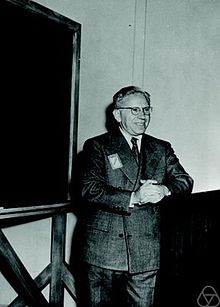- Abraham Wald
-
Abraham Wald 
Naissance 10 mars 1902
Cluj-Napoca (Autriche-Hongrie)Décès 12 janvier 1950 (à 47 ans)
Travancore (Inde)Nationalité Hongroise Champs Mathématiques, Statistiques, Théorie de la décision, Analyse séquentielle (en) Institution Université de Vienne Renommé pour Ses travaux sur la théorie de la décision et particulièrement l'analyse séquentielle modifier 
Abraham Wald (31 octobre 1902 - 13 décembre 1950) est un mathématicien hongrois qui contribua à la théorie de la décision statistique, à la géométrie à l'économétrie et fonda le domaine de l'analyse séquentielle (en) statistique[1].
En 1927, il entra à l'université de Vienne (Autriche) où il reçut un doctorat en mathématiques en 1931, sous la direction de Karl Menger[1].
De confession juive il n'alla pas à l'école le samedi, raison pour laquelle il fut instruit par ses parents. C'est également pour cette raison qu'il quitta l'Autriche en 1938. Sa femme et sa famille furent persécutées par le régime nazi. Il émigra aux États-Unis pour travailler dans la recherche en économétrie[1].
Il mourut avec sa femme dans un accident d'avion alors qu'il se rendait à un cours en Inde où le gouvernement l'avait invité[1].
Sommaire
Principales publications
(Pour une liste complète, voir (en) « The Publications of Abraham Wald », dans Annals of Mathematical Statistics, vol. 23, no 1, 1952, p. 29–33 [lien DOI].)
- (en) Abraham Wald, « A New Formula for the Index of Cost of Living », dans Econometrica, vol. 7, no 4, 1939, p. 319–331 [lien DOI (page consultée le 27 juin 2008)]
- (en) Abraham Wald, « Contributions to the Theory of Statistical Estimation and Testing Hypotheses », dans Annals of Mathematical Statistics, vol. 10, no 4, 1939, p. 299–326 [lien DOI (page consultée le 27 juin 2008)]
- (en) Abraham Wald, « The Fitting of Straight Lines if Both Variables Are Subject to Error », dans Annals of Mathematical Statistics, vol. 11, no 3, 1940, p. 284–300 [lien DOI (page consultée le 27 juin 2008)]
- (en) Abraham Wald, « Sequential Tests of Statistical Hypotheses », dans Annals of Mathematical Statistics, vol. 16, no 2, juin 1945, p. 117-186 [lien DOI]
- Abraham Wald, Sequential Analysis, New York, John Wiley & Sons, 1947 (ISBN 978-0-471-91806-6).
Voir réimpression Dover Publications : ISBN 978-0-486-43912-9
- (en) Abraham Wald, Statistical Decision Functions, John Wiley & Sons, New York ; Chapman & Hall, Londres, 1950, ix+179 p.
Voir aussi
Références
- (en) Oskar Morgenstern, « Abraham Wald, 1902-1950 », dans Econometrica, vol. 19, no 4, 1951, p. 361–367 [lien DOI (page consultée le 27 juin 2008)]
Lecrures complémentaires
- (en) Jacob Wolfowitz (en), « Abraham Wald, 1902-1950 », dans Annals of Mathematical Statistics, vol. 23, no 1, 1952, p. 1–13 [lien DOI]
- Portail de l'Autriche-Hongrie
- Portail des probabilités et des statistiques
- Portail des mathématiques
Catégories :- Naissance en 1902
- Naissance à Cluj-Napoca
- Naissance en Autriche-Hongrie
- Décès en 1950
- Statisticien
- Mathématicien hongrois
Wikimedia Foundation. 2010.
